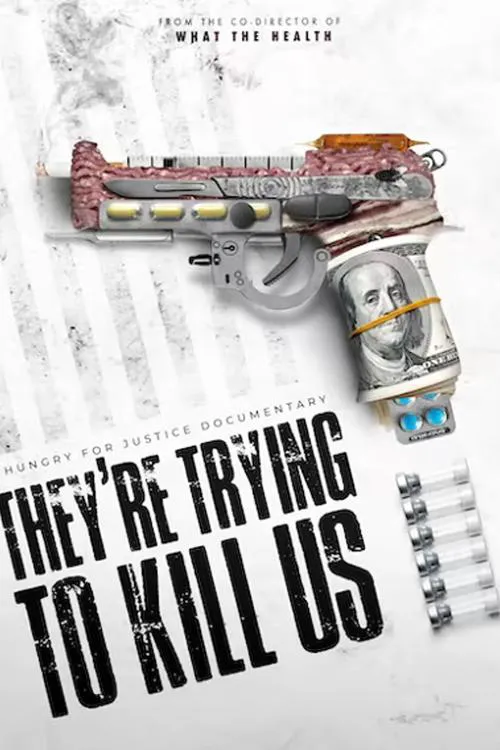They're Trying To Kill Us

Plot
In the documentary "They're Trying to Kill Us", director Eugene Jarecki skillfully navigates the complexities of nutritional and environmental racism, shedding light on the disproportionate effects of systemic injustices on communities of color. Through a thoughtful combination of interviews, archival footage, and personal stories, Jarecki's film presents a nuanced exploration of the often-overlooked intersections between the food we eat, the health impacts we suffer, and the environmental consequences we face. Jarecki begins by introducing viewers to a community at risk: predominantly African American, predominantly Latinx, and Indigenous communities, which have historically faced inadequate access to quality healthcare, nutritious food, and safe living environments. He highlights the insidious yet powerful ways in which systemic structures perpetuate health disparities, from the redlining of neighborhoods to the marketing of junk food and pharmaceuticals that exacerbate existing health conditions. Through a series of conversations with community leaders, activists, and individuals from affected communities, Jarecki brings to light the ways in which nutritional and environmental racism have real-world consequences. These individuals share personal accounts of struggling to access healthy grocery stores in their neighborhoods, of facing environmental injustices like disproportionate pollution exposure, and of experiencing healthcare providers who, often with good intentions, perpetuate rather than address the root causes of illness. One of the most striking aspects of "They're Trying to Kill Us" is its emphasis on the importance of community care and solidarity. Jarecki highlights the ways in which communities of color have been organizing and advocating for themselves for decades, often in the face of resistance and marginalization. He showcases the work of community-based initiatives that are promoting food justice through cooperatives, gardens, and educational programs, demonstrating the power of collective action in driving systemic change. Throughout the documentary, Jarecki also explores the complex relationship between plant-based diets and communities of color. While veganism is often associated with middle-class, predominantly white spaces, Jarecki challenges this narrative by highlighting the long history of plant-based diets in communities of color. He shows how traditional foods and cooking practices have been shaped by cultural heritage and ecological contexts, rather than a desire to conform to mainstream Western dietary norms. One of the compelling aspects of "They're Trying to Kill Us" is its emphasis on reclaiming the narrative around veganism and plant-based living. Jarecki encourages viewers to think beyond the tired tropes of "white privilege" and "eco-gentrification," instead emphasizing the ways in which veganism can be a tool for resistance, community-building, and healing. By featuring stories of people of color adopting plant-based diets in order to reclaim their health, their culture, and their connection to the natural world, Jarecki suggests that veganism can be a powerful form of self-love and social justice. Ultimately, "They're Trying to Kill Us" is a powerful call to action, urging viewers to confront the systemic injustices that are perpetuating health disparities in communities of color. By offering up a new vision of veganism as a tool for community care and solidarity, Jarecki's film inspires viewers to work towards a more just and equitable food system, one that prioritizes the health, well-being, and dignity of all people, regardless of their cultural background or socioeconomic status. The documentary concludes by highlighting the many organizations, initiatives, and individuals working to create positive change in communities of color. Jarecki shares stories of activists advocating for policies that support healthy food access, environmental justice, and healthcare equity. He introduces viewers to community leaders who are cultivating sustainable agriculture practices, promoting food sovereignty, and fostering cultural resilience. Through these stories, Jarecki emphasizes the power of collective action and the importance of listening to and amplifying the voices of those who have been historically marginalized. As the documentary comes to a close, viewers are left with a renewed sense of urgency and purpose, inspired to join forces with communities of color in the fight against nutritional and environmental racism. "They're Trying to Kill Us" is a timely and necessary film, one that challenges dominant narratives about veganism and plant-based living. By centering the voices and experiences of communities of color, Jarecki's film offers a powerful vision of a more just and sustainable food system, one that prioritizes community care, solidarity, and the health and well-being of all people.
Reviews
Recommendations



